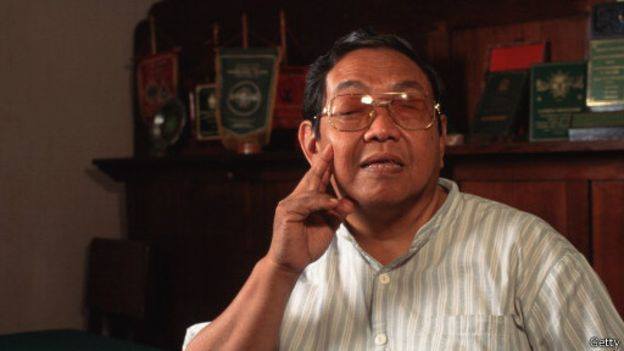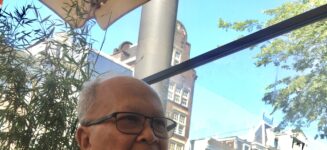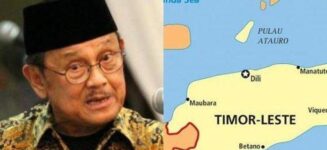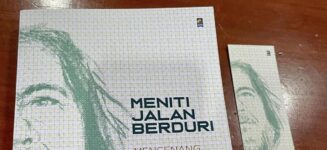Aboeprijadi Santoso, The Jakarta Post, January 15, 2010
A few weeks after the death of former president Abdurrahman “Gus Dur” Wahid, many commentaries praising his role and personality reflected not only on the man, but also the crisis that his country, even the world, has been going through. Take for instance the following comment, made long before Gus Dur’s passing:
“Your president”, then Israeli PM Shimon Peres said in an interview for Radio Netherlands in March 2000, “is like a fresh wind”.
He serves Indonesia, he serves the Muslim world by trying to bring peace, by trying to be in touch with all sides, by trying to be reasonable.
Indonesia and the Muslim world will be helped by this sort of leadership.
“I admire him, I like him very much. He thinks as a non-conventional leader. He acts more spiritually than administratively. While most leaders tend to become bureaucrats, he remains a man of movement and conviction, and I respect him very much.”
Many certainly will agree with Peres’ observations. It was in the mid-1990s that religious clashes in Indonesia sadly reached their nadir and we saw Gus Dur successfully intervene to restore a harmonious social life following the burning of 24 churches in East Java.
At the same time, amid the repressive atmosphere of Soeharto’s New Order, Gus Dur contributed to a growing awareness of human rights and democracy by joining the forces of civil society.
As leader of the biggest Muslim mass organization, Nahdlatul Ulama (NU), itself repressed during Soeharto’s early years in power, he later had to play the game to ensure NU’s and his own survival, such that one close observer, Salim Said, found there were actually only two real political players in town for some time: Soeharto and Gus Dur.
Another analyst, Moeslim Abdurrachman, suggests it was a shocking experience for Gus Dur to find, upon his return from studying abroad in the early 1970s, NU and its youth wing in political, intellectual and moral disarray. Gus Dur was in Iraq when the country fell into bloody turmoil of the mid-1960s, in which many of those youths were involved in killings.
That shock, his conscience and acute awareness of the need for democratic transformation led him later to do precisely the one thing no politician dared do: apologize for the 1965-1966 massacres and propose to lift the ban on Marxism.
In short, Gus Dur was a leader and a president of a nation in crisis and transition. And in that, he was indeed a fresh wind.
The first time I met him in 1984, he struck me as being very informal, egalitarian, liberal and critical vis-à-vis the Soeharto regime. The last time I met him at a Jakarta hospital last April he told me at length about Tan Malaka visiting his father at home.
He admired both. Tan was then a pro-independence radical and underground communist leader. In fact, Gus Dur never stopped thinking and reflecting about the state, society and Indonesia’s democratic aspirations.
For unlike Soeharto, who spent 99 percent of his career within state institutions (Dutch colonial army, Japanese-formed PETA and the TNI), Gus Dur, like Sukarno, matured politically and intellectually amid the dynamics of society, not the state. In addition, unlike Sukarno, he was a religious leader in time of politico-religious tumult.
But again like Sukarno, he was a leader who had to keep the nation united in order to achieve and guard independence (in Sukarno’s case), and break the post-dictatorial structures and restore democracy (in Gus Dur’s case).
He indicated this significant similarity of mission when, upon assuming the presidency, he said Indonesia had now “become independent for the second time”.
Unfortunately, if understandably, Gus Dur as a state leader was not generally successful. His 21-month administration was chaotic, but he was also seriously undermined by parliament and military hard-liners, who later allied with his successor, Megawati Soekarnoputri, and ended up overthrown in a constitutional coup.
Gus Dur’s close relations with Timor Leste leaders and attempts to resolve the uprisings in Aceh and Papua were not welcomed by the hard- liners in Jakarta and resulted in a mixture of courage, breakthrough and failure.
Ironically it was in Papua, where he was most warmly loved, that he failed to resolve the self-determination issue beyond symbolic acts that acknowledged the name “Papua” and its flag.
Nonetheless, maverick and eccentric though he was, Gus Dur left a precious legacy. His perception and way of dealing with rebels to keep the republic’s unity, if dilemmatic, reflected the depth of his humanity and respect for democracy while at the same time remaining patriotic and nationalistic.
That combination of universalistic and particularistic values is a big lesson. It’s a far cry from the rigid, narrow-minded nationalism which considers the unitary state sacral that still dominates today.
The artcle was published in The Jakarta Post Friday, January 15, 2010; also in http://www.etan.org/et2010/01january/16/15gusdur.htm
Cf. http://archief.wereldomroep.nl/bahasa-indonesia/article/indonesia-kehilangan-pendekar-pluralis-perekat-bangsa



